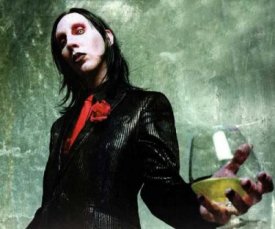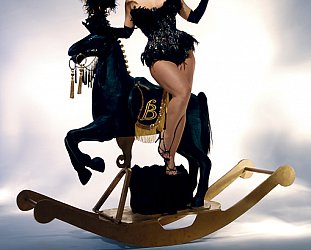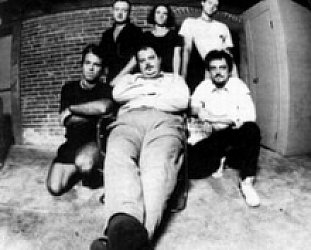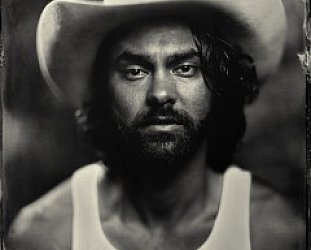Graham Reid | | 6 min read

The curious thing about Marilyn Manson isn't the pancake makeup, the alarming contact lenses or even the cover of his latest album, Mechanical Animals, where he's some kind of naked androgynous character looking like a leftover from the cover shoot for David Bowie's 1974 Diamond Dogs album.
No, the curious thing is that the music - which we must remind ourselves is actually what MM does in this world - has been so incidental.
Many people hold an opinion about Manson (who is so famous he refers to himself in the plural, just like the Queen) without having heard a note he's made. But let's face it, up until his 96 album Antichrist Superstar, Manson's sales figures epitomised the phrase "cult figure."
Still, as his antecedents -- notably Alice Cooper, bat-biting Ozzy Osbourne and Trent "I-live-in-Sharon-Tate's-house" Reznor -- all have found, controversy is good for business. And Manson's sometimes obvious Christian-baiting has proven very good for his business.
Still this side of 30, he's written an autobiography (The Long Hard Road out of Hell, ghost-written by New York Times' Neil Strauss), has appeared on the cover of every major rock publication (and in the pages of any self-respecting tabloid with the words "shock" and "rock" in close proximity), and has brought much-needed anger - and humour - back into rock'n'roll.
With Mechanical Animals he's made the best album of what looks to be a long career in the making ...
Oh yes, that Marilyn Manson, the musician one ...
On the line from somewhere in America, the former Brian Warner of Ohio rallies to go through the motions of a phone interview one more time.
It seems fair to ask, in the wake of the mountain of paper he's already generated from interviews, whether this side of his careerism will soon disappear.
"I'd like to think the technology we're provided with, like the Internet, will enable us to communicate with fans directly, and I can make one statement and everyone can hear it without the editorialising," he says wearily.
The autobiography was intended to put a full-stop on idle and tediously repetitive questions "but it didn't," he laughs.
"I chose several stories about my life which I felt showed an evolution and why I do what I do and how I got to where I was. But - intentionally or unintentionally - I may have confused people even more about me. Either way, it was something I wanted to do and it helped me get to another level."
That other level now includes a home in the Hollywood hills, celebrity status and Mechanical Animals, on which he says "wham bang, thank you glam" in songs which have reference points in T Rex and glitzy Bowie.
With a glam revival just around the corner thanks to Velvet Goldmine (the film starring Ewan McGregor and produced by Michael Stipe), his timing could be impeccable.
The way he sees it, however, Mechanical Animals is a musical vindication in the face of the cynics who previously observed, "Good quote, shame about the song."
"I tried to show how musical the band has always been, or could have been," he says. "But in the past I've chosen different ways to express myself. Antichrist Superstar was meant to be cold and emotionless and needed to sound that way.
"And this record was about feelings for the first time. It was about examining Hollywood from two distinct points of view, a very dark, alienated point of view and a decadent, exaggerated point of view. I think I've grown as a songwriter as well."
And just an unashamed acknowledgement that rock'n'roll as we know and love it is also meant to be entertainment?
"It's something I know and love, it's how I grew up on music and the bands I love like Bowie, Queen, T Rex ... the album became very referential, because the way those records made me feel was the way I wanted other people to feel. A lot of that inspired the making of this record."
Yet Manson also harbours the bigger dream and makes the distinction between himself and Smashing Pumpkins' Billy Corgan, whom he credits with pushing him musically. Tellingly, however, he sees Corgan as a musician, himself as "an artist."
"Music was the medium I picked to express my vision of the world, but it could be expressed in a book or film. To me, musicians are someone like Billy, who look at things with an attitude of trying to impress people with their ability at their instrument.
"But I've looked at music from a different point of view, to just impress people with how good it can be, or how much it can move them or open the door to all the other possibilities that come with a song.
"When I'm writing a lyric or a chord I'm also seeing an image and performance that comes with that. It all comes at the same time for me, I'm not limited to sitting in a room with a guitar and a notepad. That's not what it's about for me.
"I'm not saying one is better than the other, I'm just saying there's a distinct difference."
He says there will be a film inspired by the album - to be shot in May, maybe June - but right now he's still on the barricades of controversy which has been transformed from "a religious fear of what I do."
"Now it's become a more homophobic thing, a general concern for the moral wellbeing of our youth. Before, it was a very specific myth people had created that I was a demon that murdered kids on stage. When they finally learned that wasn't true they found different reasons to hate me, more legitimate ones I think, because what I represent is provoking and is not safe and is something that makes people think.
"And I think it's important that if parents see me or hear songs and they think, `My kid shouldn't listen to that,' that's good. They should know what their kids are listening to and they should talk about it and learn about it because it's the world - and I didn't create it, their God created it."
However, for a man who has said of late that he is tired of the religious questions, he immediately warms to a series put on behalf of the Rev Graham Capill of the Christian Heritage Party, perhaps because it's autopilot territory.
But he responds patiently until the allotted 15 minutes is interrupted by another inquisitor from the media.
With the pop-rock of Mechanical Animals, Manson has left behind the industrial noise of the past. A canny and necessary reinvention to broaden the fan base?
"I don't think I've ever - again not thinking like a musician - had any type of purity in music to represent by being true to a specific sound or style. I've always represented a way of thinking and a need to be creative, and a need to constantly try to be a stronger and greater person. So I've always recreated with every record, but at the same time I've always stayed true to what I am."
As the decade and century close Marilyn Manson has become that self-proclaimed antichrist superstar. He is the epitome of the American dream of self-actualisation, a role model even.
The final lines of that autobiography written almost two years ago read: "I can already see that America, Nothing Records, our friends and the media have perceived this to be the peak of our career.
Unfortunately for them, it's just the beginning."
Should we be very afraid?







post a comment